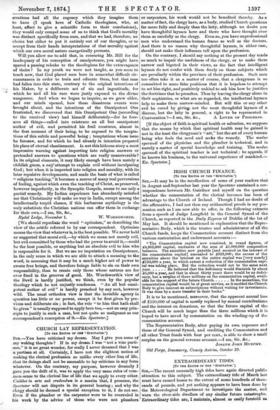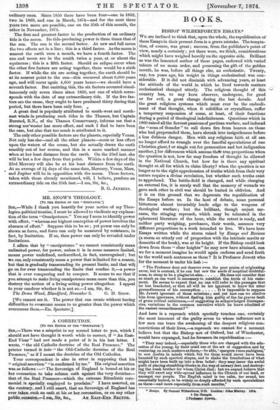EXTRAORDINARY TIDES.
(TO THZ EDITOR OF THE "SPBOTATOR.")
Sis,—The recent unusually high tides have again directed public attention to this subject. The extraordinary tide of March last must have caused losses to the extent of some hundreds of thou- sands of pounds, and yet nothing appears to have been done by the Meteorological Department • to investigate the matter, and warn the river-side dwellers of any similar future catastrophe. Extraordinary tides are, I maintain, almost as easily foretold as ordinary ones. Since 1850 there have been four—one in 1852, two in 1869, and one in March, 1874—and for the next three years two more are possible, one on the 25th of this month, the other in November, 1875.
The first and greatest factor in. the production of an ordinary tide is the moon. Its tide-producing power is three times that of the sun. The sun is the second factor. At new and full moon the two effects act in a line ; this is a third factor. .As the moon is nearest the earth once a month, we have a fourth factor. The sun and moon are in the zenith twice a year, at or about the equinoxes; this is a fifth factor. Should an eclipse occur when the other five factors are acting together, there would be a sixth factor. If while the six are acting together, the earth should be at its nearest point to the sun—this occurred about 6,000 years ago, and will occur again 4,600 years hence—we should have a seventh factor. But omitting this, the six factors occurred simul- taneously only seven times since 1850, not one of which corre- sponds with the date of any extraordinary tide. If the five fac- tors are the cause, they ought to have produced thirty during that period, but there have been only four. , A great deal is popularly attributed to south-west and north- east winds in producing such tides in the Thames, but Captain Bursted, R.N., of the Thames Conservancy, informs me that a strong nor'wester has more effect, and such I find to have been the case, but also that too much is attributed to it.
The only other possible factors are the planets, especially Venus. Not only has she—and all the other planets—more or less effect upon the waters of the ocean, but she actually draws the earth sensibly out of her course, and this in a more marked manner when at her least distance from the earth. On the 23rd inst. she will be but a few days from that point. Within a few days of the 23rd Mercury will also be at his least distance from the earth. At an average of 2* days of the same date, Mercury, Venus, Mars, and Jupiter willbe in opposition with the moon. These factors, taken with those already mentioned, will, I believe, produce an extraordinary, tide on the 25th inst.—I am, Sir, &c., B. G. JENKINS.



































 Previous page
Previous page